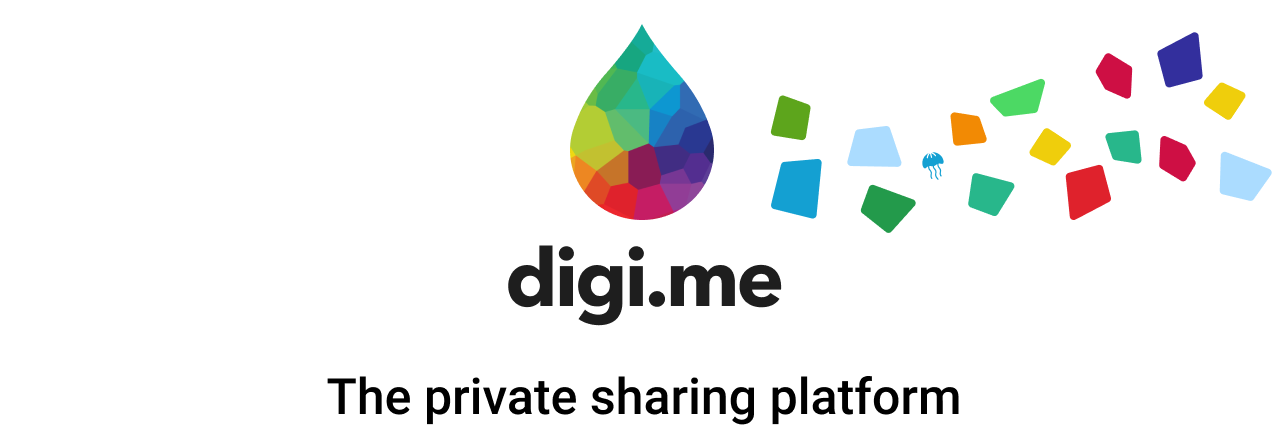The digi.me private sharing platform empowers developers to make use of user data from thousands of sources in a way that fully respects a user's privacy, and whilst conforming to GDPR. Our consent driven solution allows you to define exactly what terms you want data by, and the user to see these completely transparently, allowing them to make an informed choice as to whether to grant consent or not.
- iOS 13+
-
Add the
DigiMeSDKpackage to the dependencies within your application'sPackage.swiftor your Xcode project. Substitute"x.x.x"with the latestDigiMeSDKrelease..package(name: "DigiMeSDK", url: "https://github.com/digime/digime-sdk-ios.git", from: "x.x.x")
-
Add
DigiMeSDKto your target's dependencies:.target(name: "example", dependencies: ["DigiMeSDK"]),
import DigiMeSDK-
Add
DigiMeSDKto yourPodfile:use_frameworks! source 'https://github.com/CocoaPods/Specs.git' platform :ios, '13.0' target 'TargetName' do pod 'DigiMeSDK' end
NOTE We do not currently support linking DigiMeSDK as a Static Library.
use_frameworks! flag must be set in the Podfile
-
Navigate to the directory of your
Podfileand run the following command:$ pod install --repo-update
We have taken the most common use case for the digi.me Private Sharing SDK and compiled a quick start guide, which you can find below. Nonetheless, we implore you to explore the documentation further.
This example will show you how to configure the SDK, and get you up and running with retrieving user data.
To access the digi.me platform, you need to obtain an AppID for your application. You can get yours by filling out the registration form here.
In a production environment, you will also be required to obtain your own Contract ID and Private Key from digi.me support. However, for sandbox purposes, you can use one of the contracts from the example projects (see /Examples directory).
Because the digi.me Private Sharing SDK hooks into your browser to receive callbacks, you are required to forward the openURL event through to the SDK so that it may process responses. In your application's delegate (typically SceneDelegate) override scene:openURLContexts: method as below:
func scene(_ scene: UIScene, openURLContexts URLContexts: Set<UIOpenURLContext>) {
guard let context = URLContexts.first else {
return
}
CallbackService.shared().handleCallback(url: context.url)
}And register custom URL scheme so that your app can receive the callback from Digi.me app. Still in Info.plist add:
<key>CFBundleURLTypes</key>
<array>
<dict>
<key>CFBundleTypeRole</key>
<string>Editor</string>
<key>CFBundleURLName</key>
<string>Consent Access</string>
<key>CFBundleURLSchemes</key>
<array>
<string>digime-ca-YOUR_APP_ID</string>
</array>
</dict>
</array>where YOUR_APP_ID should be replaced with your AppID.
DigiMe is the object you will primarily interface with to use the SDK. It is instantiated with a Configuration object.
The Configuration object is instantiated with your App ID, Contract ID and Private Key. The below code snippet shows you how to combine all this to get a configured DigiMe object:
let privateKey = """
-----BEGIN RSA PRIVATE KEY-----
MIIEowIBAAKCAQEA...
-----END RSA PRIVATE KEY-----
"""
do {
let configuration = try Configuration(appId: "YOUR_APP_ID", contractId: "YOUR_CONTRACT_ID", privateKey: privateKey)
let digiMe = DigiMe(configuration: configuration)
}
catch {
...
}Before you can access a user's data, you must obtain their consent. This is achieved by calling authorize on your client object. You need to provide a service identifier for which you want to request access to; this can be found by referring the the service definitions in the developer docs or my using the Discovery API.:
digiMe.authorize(serviceId: service?.identifier, readOptions: nil) { result in
switch result {
case .success(let credentials):
// store credentials and continue on to fetch data.
case.failure(let error):
// handle failure.
}
}If a user grants consent, a session will be created under the hood; this is used by subsequent calls to get data. If the user denies consent, an error stating this is returned. See Handling Errors.
Once you have a session, you can request data. We strive to make this as simple as possible, so expose a single method to do so:
let credentials = my_stored_credentials
digiMe.readAllFiles(credentials: credentials, readOptions: nil) { result in
switch result {
case .success(let file):
// Access data or metadata of file.
case .failure(let error):
// Handle Error
}
} completion: { result in
switch result {
case .success(let (fileList, refreshedCredentials)):
// Handle success and update stored credentials as these may have been refreshed.
case .failure(let error):
// Handle failure.
}
}For each file, the first 'file handler' block will be called. If the download was successful, you will receive a File object. If the download fails, an error.
Once all files are downloaded, the second block will be invoked to inform you of this. In the case that the data stream is interrupted, or if the session obtained above isn't valid (it may have expired, for example), you will receive an error in the second block. See Handling Errors.
File exposes the property data which contains the file's raw data along with the mimeType property. For files with JSON or image mime types, there are convenience methods to decode that raw data into the appropriate format, so that you can easily extract the values you need to power your app. In addition, metadata is available describing the file. In this example, as the data comes from external services, the metadata will be a mapped type describing the file's contents and details of associated service.
Note that we also expose other methods if you prefer to manage this process yourself.
digi.me prides itself in offering our SDKs completely open source, under the Apache 2.0 Licence; we welcome contributions from all developers.
We ask that when contributing, you ensure your changes meet our Contribution Guidelines before submitting a pull request.
The topics discussed under Quick Start are just a small part of the power digi.me Private Sharing gives to data consumers such as yourself. We highly encourage you to explore the Documentation for more in-depth examples and guides, as well as troubleshooting advice and showcases of the plethora of capabilities on offer.
Additionally, there are a number of example apps built on digi.me in the examples folder. Feel free to have a look at those to get an insight into the power of Private Sharing.






